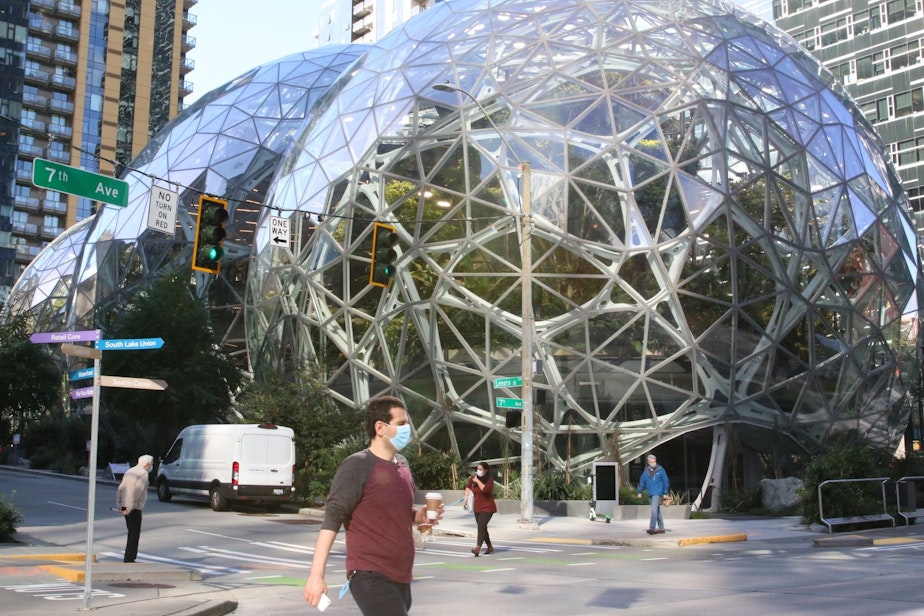Recruiting Black tech workers: Will remote work help make Seattle more attractive?

Seattle has historically had difficulty recruiting and retaining Black tech workers. That’s led to a problem: Compared to the general population, Black tech workers are underrepresented.
But amid the pandemic, local tech companies are tapping into an opportunity to diversify their workforces — remotely.
Herman Haggerty is a Black tech worker from Texas. He moved to Seattle in 2017, to work for Amazon.
Three years later, he left. He said he was tired of not being recognized for his achievements, and was tired of people not knowing how to relate to him.
“I’m not sure if that’s just the quirkiness of engineers, because you know, I’ve been around a lot of engineers and they’re inherently quiet," Haggerty said. "But you know when they don’t really know how to connect with you.”
Haggerty said that because people didn’t know how to talk to him, they’d leave him out of technical conversations. Instead, they'd attempt to steer the conversation toward something they assumed he’d like: Hip-hop music for example.
This, he said, led to him missing promotion opportunities.
Sponsored
"It always feels like an uphill battle just because of that core competency — of not being able to communicate with each other," he said. "It seemed like they were always kind of giving me the runaround."
Haggerty ultimately concluded that this wasn’t an Amazon-specific problem — it's a Pacific Northwest problem.
In the South, he said, racism is more overt. "In Seattle, it’s more passive. They may not even know that they’re being racist."
So he moved to Austin, where he said he's much happier.
"It’s very diverse, and … I mean, the first thing I did when I got off the plane here — a random person said 'hi' to me. You forget that people actually talk to each other, in other places."
Sponsored

Seattle and Portland are two of the whitest cities in the country. That, combined with the so-called Seattle freeze, and a sense that racism is passive in the Pacific Northwest, has discouraged many Black people in general — and Black tech workers specifically — from staying in the region for very long, if they're even willing to relocate here at all.
A study of Portland found that 97% of Black workers experienced discrimination at work, and only 1% felt welcomed by their communities outside of work. This leaves tech companies that want to diversify their workforces in a difficult position.
Michael Schutzler of the Washington Technology Industry Association said local tech companies go on recruiting missions to cities with bigger Black populations. “There is a giant pool of talent in Atlanta," for instance, he said. But a lot of people don’t want to leave their communities.
It takes more than just reaching out on the part of employers to solve the problem of underrepresentation, and the issue extends beyond the workplace.
Sponsored
For example, Mark Nyon in New York, said “I have family, friends and community here, people who supported me and helped keep me sane and navigate the challenges of being Black in the tech industry. It would be difficult for me to find that sustenance if I moved out to Seattle."
Which is where the pandemic – and working remotely comes in.
We used to have this assumption that you had to physically commute into an office every day. But Michael Schutzler said remote work changes everything.
Tech companies can hire workers from places such as Atlanta, D.C., New York, and Houston, and let them work remotely from those cities.
“That creates a completely new dynamic for who it is they’re recruiting," Schutzler said. "And suddenly, you are seeing a larger number of women and people of color in the entering classes than you did before.”
Sponsored
Multiple Black tech workers told KUOW they’ve been receiving more and more messages on LinkedIn about remote work, lately. But the extent of the trend and what it means for Seattle in the long run remain unclear.
If workers don’t have to relocate to Seattle, does that mean Seattle could actually become less diverse than it is now?
Not if Abas Hersi can help it. He’s an 18-year-old Black computer science student who just started Seattle’s chapter of an organization called Blacks in Technology. He lives in Tukwila, a city that’s 17% Black as compared to Seattle’s 7%.
“It’s a lot cheaper to live here than it is to live in Seattle," Hersi said. "But realistically I’m hoping to get employed in Seattle. And so, I think that would be a great combination of me not abandoning my roots and still finding employment in the tech industry in Seattle.”
This is one strategy recommended by Partners in Diversity, the organization that produced that study about Portland:
Sponsored
They recommend that communities educate, empower and promote the Black workforce already living nearby. That way, hiring Black tech workers doesn’t have to mean recruiting them away from their friends and families.
Hersi believes this strategy could address the root of the problem. “This would help put the Black community at large in a better position financially in order to cope with the rising costs of living, so that it can mitigate the effects of gentrification,” he said.




